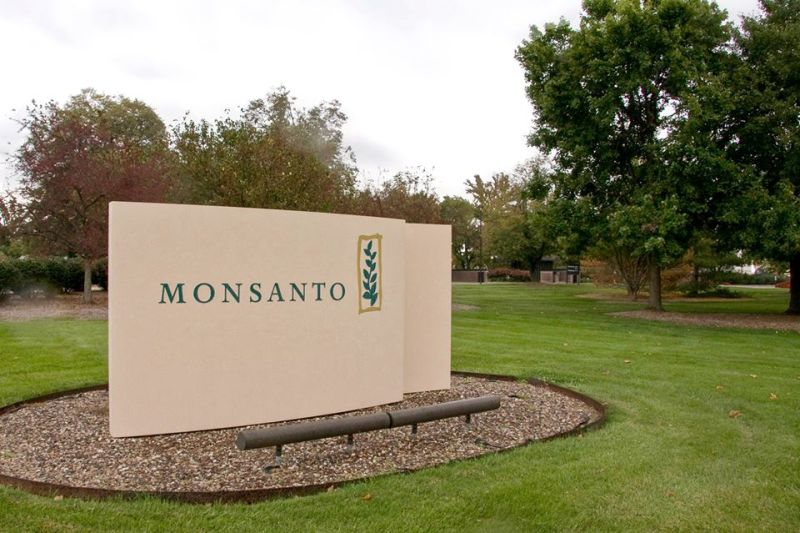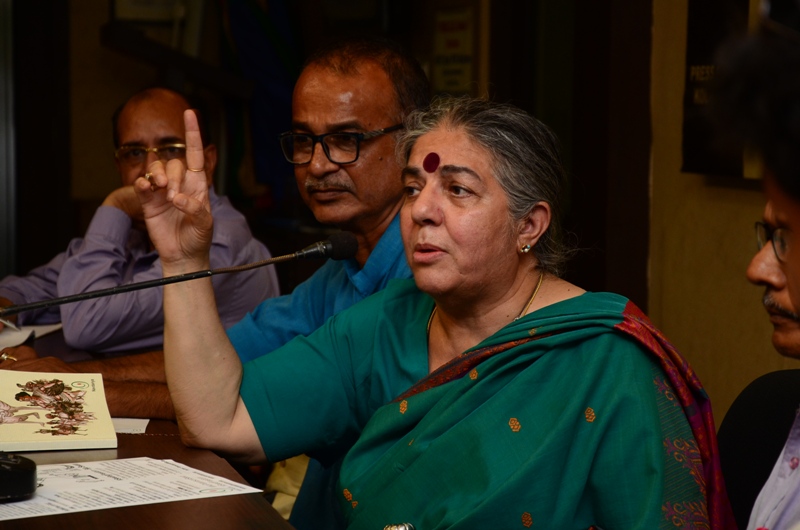
Much ado over India’s Monsanto alliance
St. Louis-based agrichemical giant Monsanto has recently weathered a crush of negative international press and harsh public scrutiny – especially in India.
Some observers hope a looming $66 billion takeover by the German company Bayer will help soothe its battered reputation. Financial analysts like Jason Miner, senior global chemicals analyst for Bloomberg Intelligence, say biotech companies like the impending chemical-agricultural behemoth are essential to India’s future.
But others, most notably environmental activists, reject this idea and want the company to leave their country.

Monsanto representatives declined comment on the pending merger and public criticism of the company, which is famous for herbicides such as Roundup and insecticides such as Bollgard II. But they pointed to a 2016 sustainability report showing positive results for Monsanto’s agricultural outreach programs in India, most notably Sustainable Harvest Agriculture Resource Environment, or SHARE, which the report says educated and increased productivity among nearly 71,000 small farmers.
Other initiatives deal with sanitation, clean water and encouraging education for farmers’ children. And the company works to reduce child labor through a committee that keeps watch on business partners to ensure no child under 14 works in the fields and awards school funding to any “model village” that has 50 farms and no childlaborers.
Still, critics abound in both India and in America.
Richard Oswald, president of the Missouri Farmers Union, said Monsanto’s monopoly has grown by consuming nearly 600 smaller agriculture businesses over the past 50 years, giving the company colossal control over the prices charged to farmers. He fears the merger with Bayer will simply increase the company’s pricing power, and said,“Famers don’t really seem to take that to heart.”
At the same time, he said, the public is increasingly aware of concerns surrounding glyphosate, the main ingredient in Roundup. According to the National Pesticide Information Center, a cooperative agreement between Oregon State University and the U.S. Environmental Protection Agency, studies have shown conflicting results on whether products containing glyphosate are associated with cancer. Some have associated use of glyphosate with non-Hodgkin lymphoma. Monsanto has argued glyphosate is not a carcinogen.
“…The public is looking at increased bad publicity about glyphosatebeing found in our food and even in the tissue of our bodies,” Oswald said.
Many of the same concerns trouble people across the globe, including in India, home to Monsanto’s sole daughter company outside of the U.S.
The Monsanto Tribunal is an international group whose purpose is to hold Monsanto accountable for ecocide or human rights violations. A board of judges listened to victims’ testimonies and delivered a legal opinion on Monsanto’s actions last April in The Hague in the Netherlands. The tribunal delivered a guilty verdict, stating the company infringed on “fundamental human rights.”
Vandana Shiva, an Indian environmental activist, has fiercely opposed Monsanto since 1987 and is well-known for boldly voicing her contempt for the company’s actions. She has called Monsanto a “criminal” entity and said she took the company to court in 1998 on charges of illegal smuggling of BTcotton, a genetically-modified, insect resistant variety, into India. She claimed Monsanto is now illegally testing BT cotton seeds on farmer’s fields.
“The Monsanto Tribunal is showing that…it’s a criminal in its behavior of not obeying this law,” Shiva said in an interview to our correspondents.
Krishna Vir Chaudhary, a farmer leader, joined Shiva in submitting a report to India’s National Human Rights Commission allegingMonsanto trapped farmers in debt, created a monopoly on seed price control and sued Indian companies for not paying royalties for using their seed, which conflicts with patent law in Indian courts.
According to reporting by Reuters, India’s right-wing, Hindu nationalistic Prime Minister Narendra Modi -- and the country’s Agriculture Ministry -- called for an anti-trust regulation against what they consider Monsanto’s monopolistic practices. They also complained that Monsanto cut the royalties it was able to charge farmers, a practice thought to have played a part in the farmer suicide epidemic in India.
Shiva said she believes the company’s decision to merge with Bayer is its way of repairing its reputation and fooling the public into thinking the company is being purchased and controlled by Bayer when it is actually maintaining the same fidelity, capital research and basic structure. She said she fears the merger will lead to a company powerful enough to manipulate India’s government.
Critics say Monsanto isn’t being bought by a flawless company. Bayer’s annual reports, show it’s no stranger to controversy or legal suits. Amongan extensive list of lawsuits, there were 2,300 pending legal claims last January for users who experienced health-related problems, some of them fatal, from a generic version of the oral contraceptive Yasmin.
But there are those who believe most farmers in India would be worse off without Monsanto’s help and that regardless of the company’s faults and reputation, India will need its technology.
Bhagirath Choudhary, director of the South Asia Biotechnology Center in New Delhi, said Monsanto gave India BT cotton technology in 2002, allowing farmers to triple their yields from 2002 to 2015. Today, India produces 39 million bales of cotton. The merger can’t be stopped, Choudhary said, so India should look for ways to benefit from its inevitability.
“I am advocating for all those companies who have the technology that can help the Indian farmers, and Monsanto is one such,” said Choudhary.
But Shiva and her supporters say the praises for Monsanto’s technological efficiency with farmers have been largely exaggerated and Indian farmers would earn “four to ten times more” by not spending money on Monsanto’s seed.
“They had said that they would do everything -- because I have been in debates with them -- they said they will grow food on the moon, they will do nitrogen fixing. They haven’t managed to go beyond sale of gene traits…its’ a very crude technology.”
Still, most people concede — as evidenced by the company’s investment portfolio -- that Monsanto Growth Ventures, the company’s venture capital arm, has been a heavy investor in bio-tech startups.It has helped fund some budding firmsin digital agriculture “aiming to be the next Google or Skype of farm data management systems,” Miner said.
As controversy swirls, other seed and chemical companies are also planning to merge – driven in part by the hope of servinggrowing populationsin countries like India and China with genetically-modified seeds and crops.
Miner said there are concerns that these mergers will decrease competition, leading to less incentive for cutting-edge research and development in biotechnology. To ensure against too much market dominance, anti-trust regulators are meticulously inspecting these companies, setting the Monsanto-Bayermerger completion date back to late 2017.
Meanwhile, some Indian activists, businessmen, and others are looking for ways for India to sustain its people without a major agrochemical conglomerate. Shiva, for example, started the BijaVidyapeeth, or “Earth University,” through her nonprofit organization, Navdanya, which helps teach farmers alternative systems of agro ecology in order to get out of debt and produce healthier foods.
But financial analysts say India is a growing economy where companies like Monsanto should invest, not divest. “It’s a vibrant market for agricultural inputs for farming,” Miner said, adding that the future holds even “more growth opportunity.”
Interact with Sudipto: @thingsDeepsays and Christopher: @CBTStafford
Banner Image: potatopro.com
Images: Avishek Mitra and Monsanto Facebook
Support Our Journalism
We cannot do without you.. your contribution supports unbiased journalism
IBNS is not driven by any ism- not wokeism, not racism, not skewed secularism, not hyper right-wing or left liberal ideals, nor by any hardline religious beliefs or hyper nationalism. We want to serve you good old objective news, as they are. We do not judge or preach. We let people decide for themselves. We only try to present factual and well-sourced news.








